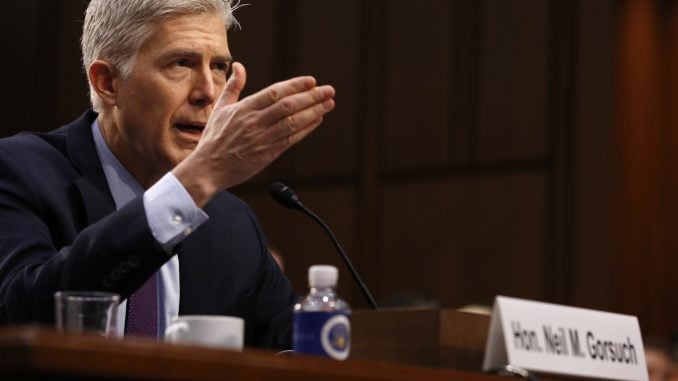
WASHINGTON Judge Neil Gorsuch, President Donald Trump’s Supreme Court pick, faced his second of four days of Senate hearings on Tuesday. Known for his independence and scholarly approach to law, he told lawmakers that he would have no trouble ruling against the president.Answering questions from senators on the Senate Judiciary Committee, Gorsuch said Trump never asked him to overturn the 1973 Supreme Court ruling legalizing abortion nationwide, saying if the Republican president had done so “I would have walked out the door.”Trump promised during last year’s presidential campaign to appoint an anti-abortion justice who would overturn the landmark Roe v. Wade ruling, which many conservatives want reversed.If confirmed by the Senate as expected, Gorsuch would restore the nine-seat court’s conservative majority at a time when Republicans control Congress and the White House. But the conservative federal appeals court judge from Colorado repeatedly said he was beyond politics.”When I became a judge, they gave me a gavel, not a rubber-stamp,” Gorsuch said, adding that no one, including the president, was “above the law.””A good judge doesn’t give a whit about politics or the political implications of his or her decision, (and) decides where the law takes him or her fearlessly,” Gorsuch added.Republicans have praised Gorsuch, 49, as highly qualified. Democrats, who have slim chances of blocking his nomination, have questioned his suitability, with some portraying him as favoring corporate interests and insufficiently independent of Trump.Chuck Grassley, the panel’s Republican chairman, asked Gorsuch “whether you’d have any trouble ruling against a president who appointed you.””That’s a softball, Mr. Chairman,” Gorsuch said. “I have no difficulty ruling against or for any party, other than based on what the law and facts in the particular case require. And I’m heartened by the support I have received from people who recognize that there’s no such thing as a Republican judge or a Democratic judge. We just have judges in this country.””I have offered no promises on how I’d rule in any case to anyone. And I don’t think it’s appropriate for a judge to do so, no matter who’s doing the asking,” Gorsuch added.Gorsuch’s nomination fulfills what many conservative voters identified as their top priority throughout the 2016 presidential campaign; appointing a constitutionalist and a pragmatic conservative to a lifetime seat on the Supreme Court. In a Twitter post during the hearing on Tuesday, Trump praised Gorsuch as “the kind of judge we need” for the high court.The seat Gorsuch was nominated to fill has been vacant for 13 months, since the death of conservative justice Antonin Scalia.Some Democrats have said Republicans “stole” a Supreme Court seat last year when the Senate refused to consider Democratic former President Barack Obama’s nominee to replace Scalia, appellate judge Merrick Garland. Under questioning by Democrat Patrick Leahy, Gorsuch called Garland an “outstanding judge,” but refused to answer whether Obama’s nominee had been treated fairly by Senate Republicans.Gorsuch said Supreme Court precedents deserve respect, even as he sidestepped answering whether he thought a series of contentious cases from the past had been decided correctly, including Roe v. Wade and cases on gun rights, political spending, religious rights and the ruling tipping the 2000 presidential election to Republican George W. Bush.”I’m not in a position to tell you whether I personally like or dislike a precedent. That’s not relevant to my job,” he added.He also said it would be “beginning of the end” of the independent judiciary if judges had to indicate how they would rule in future cases.Dianne Feinstein, the committee’s senior Democrat, asked Gorsuch whether Roe v. Wade ruling should be considered a “super precedent” because its central holding had been upheld in subsequent cases.”A good judge will consider it as precedent of the United States Supreme Court worthy of treatment of precedent like any other,” Gorsuch said, adding that the ruling has been reaffirmed many times.Pressing a Democratic concern that Gorsuch favors corporate interests, Feinstein mentioned some of his prior opinions, asking, “How do we have confidence in you that you won’t just be for the big corporations, that you will be for the little man?”Answering a later question from Republican Orrin Hatch, Gorsuch said, “A judge is there to make sure that every person, poor or rich, mighty or meek, gets equal protection of the law.”



